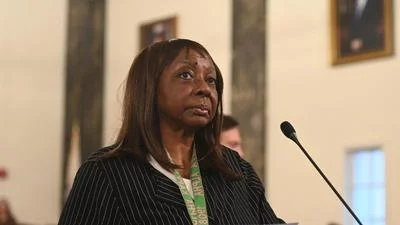Illinois State Senate District 11 issued the following announcement on Sept. 5.
State Senator Martin A. Sandoval (D- Chicago) delivered the following remarks today before the Illinois Commerce Commission’s Annual Supplier Diversity Policy Session:
Good morning. Thank you, Chairwoman Zalewski and members of the Illinois Commerce Commission.
Madame Chair, let me begin by saying congratulations on your appointment and confirmation. Y felicitaciones Comisionada Bocanegra.
It is a new day in Illinois. With Governor Pritzker’s leadership, this past Spring we passed a tremendous package of programs, laws and reforms. They were designed not only to deal with our state’s budgetary crisis but also to ensure that while doing so, we also provided economic opportunities for Illinois people of color.
It has been 6 years since the ICC held the first of these Supplier Diversity Policy Sessions. At that session, then Commissioner Miguel del Valle held up a woefully inadequate report. Some progress was made in those early years. The reports improved to a degree.
Notwithstanding the incremental improvements that utilities have made year after year, the ICC still hasn’t done enough to push to require utility companies to diversify their spending and to use their substantial purchasing power to lift-up communities of color.
The law requires the ICC to secure two different reports from gas, electric, and water companies every year: an annual report, and a diversity report. The diversity report must include information about utilities’ spending with minority-owned, female-owned, veteran-owned, and small business enterprises.
I cosponsored the original legislation calling for these reports with Representative Will Davis all those years ago because we wanted good quality information on utility spending as it relates to supplier diversity.
Today, I’m calling on the ICC to improve the quality of the information in the reports and the quality of the outcomes resulting from the disclosures in those reports. I have five recommendations.
First, the ICC should require companies to analyze the same key markers. While I appreciate that the utility company marketing departments want to convey positive messages, the legislature is looking for an easy to read format that relates the information we need to know.
The diversity report should indicate how much of the diverse spend goes to firms based in Illinois. Many of the utilities have parent companies that do business with diverse spenders in other states. It’s unclear in these reports if the utilities are taking credit for diverse companies in other states. I want to know about business in Illinois.
Every category of service should include a total diverse spend and a total non-diverse spend – I shouldn’t have to guess at the percentages.
And I shouldn’t have to use a magnifying glass to check the numbers.
The ICC should require enough uniformity to make it easy for legislators and the public to absorb the information.
Second, and this is critical, the ICC should clearly define “professional services” and restrict what gets included as a service.
I want to share an example that stood out to me when reviewing these reports.
One company took credit for spending $40M with minority (MBE) firms for professional services. But $30M of that amount seems to have been used for printing and mailing costs; that’s a lot of money for printing, even if it’s for printing of monthly bills, so it would appear that the amount includes postage to mail those bills. Diversity reports should not confuse goods and services for professional services.
Counting US postage costs as part of your minority professional services spend to fluff up poor numbers is akin to putting lipstick on a pig.
Third, the ICC must require utilities to provide precise data about utilization of people of color.
Utility companies are giving themselves a big pat on the back for their “diverse” spending. But it appears that—in no small measure—the companies are using the same group of vendors they’ve always used; they’ve just learned to characterize those vendors as “diverse.”
One utility company highlighted spending of $1.9M in legal services with “diverse” firms. But the appendix of the same report indicated that the company spent just $61,000 with an African American law firm, and zero dollars with firms owned by Latinx or Native American people. The same company’s annual report (also filed with the ICC but not cross-referenced in the diversity report) showed that the “diverse” legal services were provided by a white, male veteran-owned law firm.
All minority spending is diverse, but not all of diverse spending is minority. I want to know about spending with minority-owned businesses.
Fourth, the ICC should require utilities to do more to get work to people of color.
Several of the utilities in the room today provide service within Cook County, where black people comprise 24% of the population, and Latinx people comprise 26% of the population.
For all the utilities operating in places where minorities make up a significant percentage of your customer base: you have a responsibility to support communities in your service area by doing business with people who look like your customers.
That brings me to my fifth challenge to the commissioners of the ICC. The time has come for the ICC to audit these diversity reports and the annual reports. The ICC must read and compare the diversity reports to the yearly reports, call out inconsistencies, and analyze how the companies are truly performing.
Furthermore, I believe that the legislature and the public at large should receive a report from the ICC, in a format that is understandable, signed by the chairman and the members of the commission, certifying that the ICC accepts and is okay with the performance of the utilities.
The ICC should breakdown these numbers and specifically list spending with Hispanic-owned companies, with African American- owned companies, with women-owned companies, LGBTQ plus owned-companies, Asian-owned companies, and veteran-owned companies.
The ICC shouldn’t lump them all together, and neither should the utilities.
I am not interested in playing “las escondidillas” – hide and go seek – in these reports for good numbers. I am calling on the ICC to create its own summary report. The public shouldn’t be required to cross reference multiple reports. We shouldn’t have to sort through misleading data. So, the ICC must step in just like you do when the utilities fail to carry out any other mandate. The reason I’m calling for an audit system is to hold the ICC accountable for the performance of the utility companies.
I fully appreciate that the ICC is a “Creature of Illinois Statute.” I also appreciate that you also have broad authority in implementing those statutes under your purview. Use it.
Now I don’t have any direct control over our utility companies, but as a state senator, I do have oversight of the ICC and part of that oversight means working with my colleagues on making sure that the ICC is living up to its mandate to promote diversification of vendors used by utility companies.
Ladies and gentlemen, this is personal for me.
I represent some of the most ethnically and culturally diverse communities in the United States. I represent a large swath of the Southwest side of Chicago.
I can’t in good conscience go back to my constituents and say that our state’s utilities are all doing their part to expand opportunities in communities of color because - although the companies are improving, and making an effort, and recharacterizing the information – the utilities (and therefore the ICC) still aren’t doing enough.
As I said at the beginning, Illinois has firmly turned a page in its political history. Governor Pritzker is personally committed to supporting our working minority families and businesses. As an example: he personally committed to having the most diverse cabinet in the country. A report just this week found that of 225 key posts within his administration and at state boards and commissions, Governor Pritzker’s administration officials are 41 percent female and 44 percent people of color.
Further, this is the most diverse ICC that I have sat before. Impressive.
But now this most diverse Government needs to drive those same kinds of results in the private sector.
Commerce means money; money creates opportunity, and opportunity is a silver bullet for fighting the problems that disproportionately affect minority communities.
Making investments in minority-owned firms, putting people back to work, and recognizing the indisputable value that comes with having a diverse workforce is how we break the cycle of poverty and empower the next generation of minorities.
Thank you all for listening and for your continued support of this important mission.
Original source can be found here.






 Alerts Sign-up
Alerts Sign-up